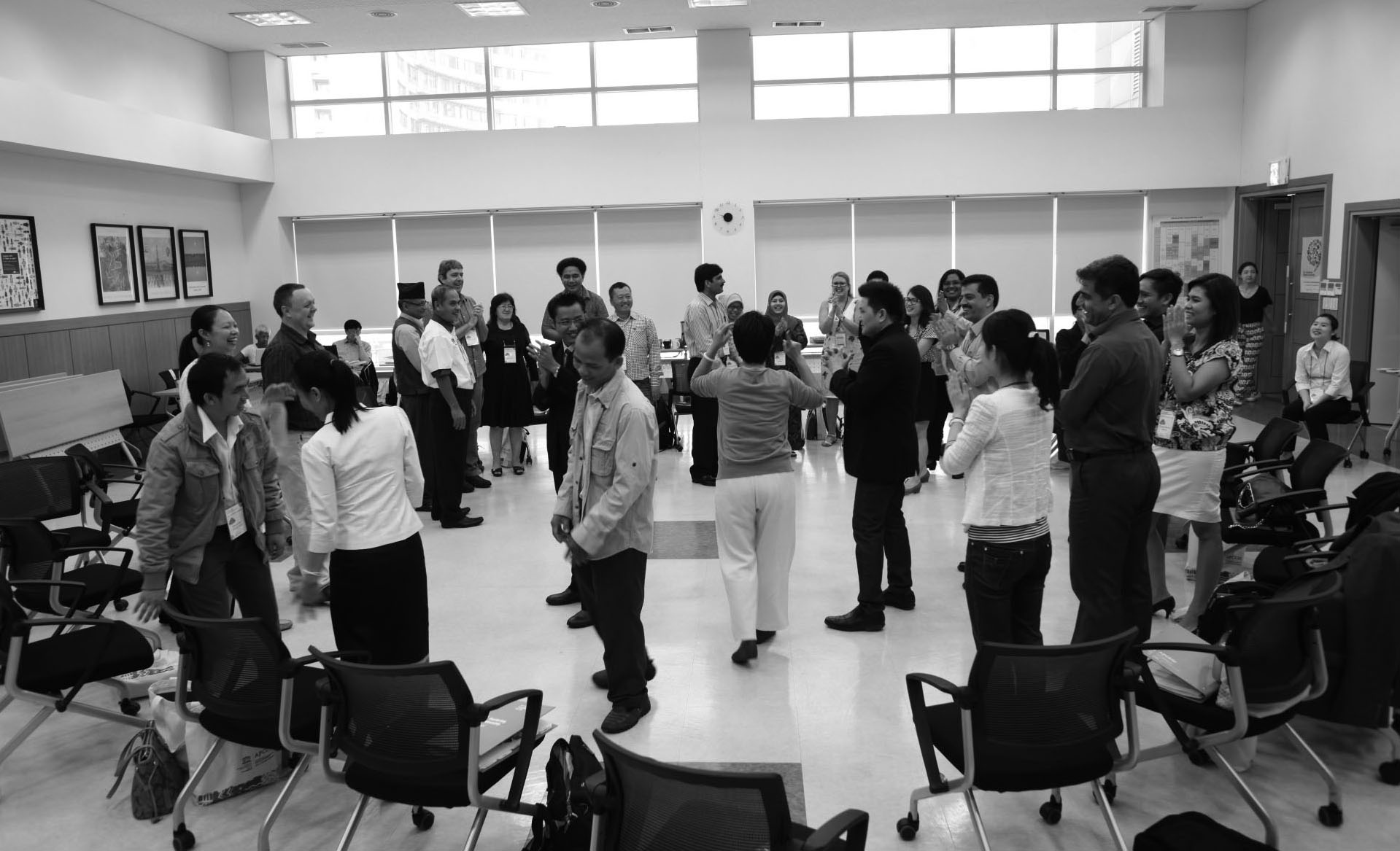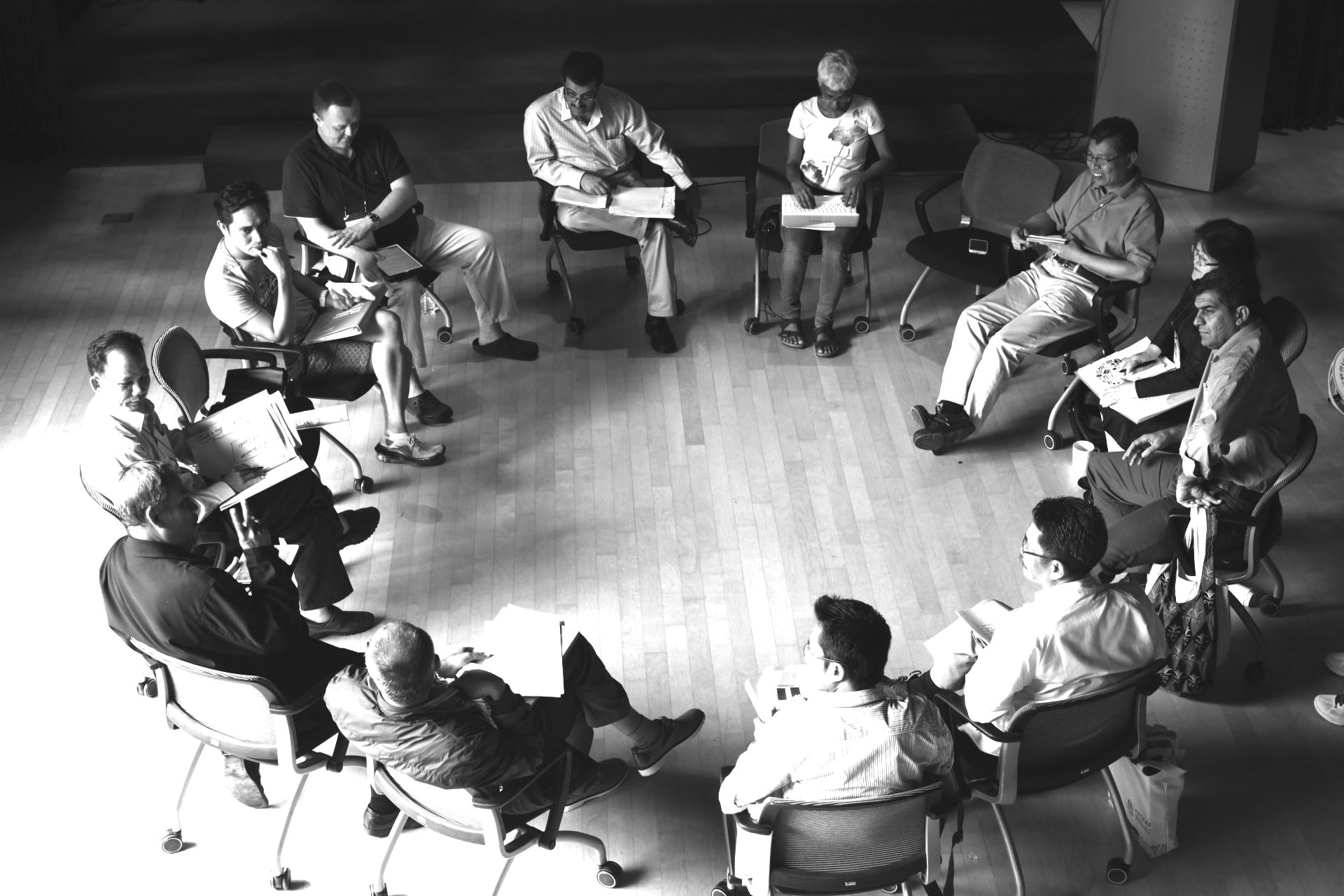- TOP
- 国際人権基準の動向
- FOCUS
- March 2015 - Volume Vol. 79
- APCEIU: Facilitating Human Rights Education in the Region
FOCUS March 2015 Volume Vol. 79
APCEIU: Facilitating Human Rights Education in the Region
The 30th General Conference of UNESCO (November 1999) resolved to establish the Asia-Pacific Centre of Education for International Understanding (APCEIU) in line with UNESCO’s responsibility to “promote education for international understanding, justice, freedom, human rights and peace.”[1] The General Conference resolution states that the
main function of the proposed centre is to carry out regional cooperative and collaborative work in the field of education for international understanding, inter alia on research and development, training, teaching materials development, information dissemination, and international conferences and/or workshops...[2]
The Korean government supported the establishment of APCEIU in 2000, and continues to provide financial support for its operations in line with its formal agreement with UNESCO.
UNESCO recognizes APCEIU as its focal point[3] for centers under its Education Sector Category 2.[4] APCEIU has been holding various activities every year including training workshops, preparation of publications, teacher exchanges, research and development of educational resources.
Recently, its programs have been linked to the United Nations (UN) Global Education First Initiative (GEFI) launched in 2012 to foster global citizenship.
Flagship Training Program

APCEIU's flagship training program, the Asia-Pacific Training Workshop on Education for International Understanding (APTW), has been held annually since 2001. Designed as a “Training of Trainers (TOT) program,” APTW aims to enhance the participants' knowledge, skills, and commitment to Education for International Understanding (EIU) and further enable them to competently design and implement EIU training activities in their local and national contexts. The 2014 program had the theme "EIU, Fostering Global Citizenship," and provided a platform where participants could learn, experience, share and reflect upon various issues on education to foster global citizenship in today's complex, interconnected society. Fostering global citizenship is one of the three key priorities of the UN's Global Education First Initiative (GEFI) and is in line with EIU's core values in terms of the promotion of learning to live together in order to forge more just, peaceful, and inclusive societies.
The intensive nine-day 2014 APTW included lectures, discussions, workshops, in-depth seminars, field visits, action plan development as well as formal and informal work in small groups. It was held in Seoul and in an educational center inside a village in the demilitarized zone (DMZ) on 21-29 August 2014.
2014 APTW Objectives
The objectives of APTW for 2014 included the following:
• To expand the participants' understanding and knowledge of key concepts and principles of EIU/GCE;
• To reorient the participants' perspectives towards a Culture of Peace through critical and reflective analysis of the current educational issues;
• To strengthen the participants' practical skills to design and implement EIU/GCE training programs tailored to their respective local context.
APCEIU defines Education for International Understanding (EIU) as a holistic and multi-dimensional educational initiative to promote learning to live together for a Culture of Peace. EIU advocates participatory democracy, human rights and dignity, social and economic equity, ecological sustainability, and peaceful reconciliation of conflicts. EIU pedagogy emphasizes transformative and inclusive education, relevance of knowledge, empowerment of learners, as well as holistic approaches. To APCEIU, EIU is interchangeably called Global Citizenship Education (GCE).
Program
The 2014 APTW had six subthemes, namely, EIU, human rights education, cultural diversity and intercultural understanding, education for global/local justice, education for sustainable futures, and education for peaceful conflict resolution. Human rights are also partly discussed in the other subthemes. There is also a session on pedagogy.
The training program also had significant time allotted to the development of plans on how to implement EIU/GCE program in the participants’ respective areas of work.
Participants
APTW facilitates the training of educators and education officials from different countries in Asia-Pacific. It has given particular attention to educators from Central Asia (including Kyrgyztan, Uzbekistan, Kazakhstan, Afghanistan and Iran), and South Pacific (including Fiji, Vanuatu, and Solomon Islands).
School teachers, school administrators, education ministry officials, education institute officers, university professors and officials, and officers of the UNESCO National Commissions have participated in the APTW throughout its fourteen years of existence.
The participation of educators and education officials from different subregions of the Asia-Pacific is a significant merit of APTW. Among the programs that provide the study of human rights at the Asia-Pacific level, APTW has the advantage of having support from both the United Nations (through its status as a UNESCO-mandated institution) and the national governments (through the National Commissions for UNESCO which in many cases are under either the Ministry of Education or the Ministry of Foreign Affairs[5]). Its activities on other issues have been supported by UNESCO Asia-Pacific Education Bureau and in collaboration with the Southeast Asia Ministers of Education Organization (SEAMEO).
Role of HURIGHTS OSAKA
HURIGHTS OSAKA had the opportunity to contribute to the development of APCEIU's human rights education program in its early stage through the 2000 “Regional Workshop on Human Rights in Asia and the Pacific: Challenges and Strategies for the Protection of Human Rights” organized by the Korean National Commission for UNESCO (KNCU) and the then ACEIU.[6] The acronym ACEIU was subsequently changed to APCEIU. This collaboration was repeated in 2003 through the conference entitled “Human Rights Education in Asia-Pacific: Challenges and Strategies” held in Bangkok.[7] In both activities, representatives of non-governmental organizations were the main participants.
HURIGHTS OSAKA has likewise been invited to participate in a number of APCEIU-organized/supported conferences and workshops including the 2013 and 2014 APTWs.
Regional Task
APCEIU clearly falls within the category of institutions that provide human rights education. As a UNESCO-mandated institution, APCEIU has the status that allows it to promote human rights in the field of education among governments.
The financial support provided by the Korean government, which is relatively substantial considering the programs and projects being handled year after year, supplies the stability that is needed in regional programs.
APCEIU is a much-welcomed support for human rights education in the Asia-Pacific region.

For more information, please contact: Asia-Pacific Centre of Education for International Understanding (APCEIU), 26-1 Guro-dong, Guro-gu, Seoul, Republic of Korea 152-050; ph (82-2) 774-3933; fax (82-2) 774-3958; e-mail: ent@unescoapceiu.org ; www.unescoapceiu.org.
[1] Text from resolution adopted on the report of Commission II at the 26th plenary meeting, on 17 November 1999,
[4] Education Sector Category 2 Centres
Category 2 Centres are recognized as an important extension of UNESCO's programme delivery arm and a means to raise UNESCO's profile in Member States. All Category 2 Centres in education contribute to one or more of the Sector's priority areas of teachers, literacy, TVET[Technical Vocational Education and Training], and sector-wide planning.
Category 2 Centres also provide opportunities to showcase and share the capacity, technical expertise, and knowledge of Member States. They can facilitate regional networking and have the potential to act as resource hubs in specific education fields.
Source: www.unesco.org/new/en/education/worldwide/unesco-institutes-and-centres/education-centres/
[5] It should be noted however that the Korean National Commission for UNESCO (KNCU), while receiving support from the Korean government, is an autonomous institution. The 1963 law that created it provides for the “autonomy of the organization, its finances and programme management.” See the website of KNCU, www.unesco.or.kr/eng/front/about_us/global_02.asp.
[6] See report on the workshop, “Workshop for Human Rights NGOs in Asia and the Pacific,” FOCUS Asia-Pacific, volume 22, December 2000, www.hurights.or.jp/archives/focus/section2/2000/12/workshop-for-human-rights-ngos-in-asia-and-the-pacific.html.
[7] This conference was organized in cooperation with the Asia-Pacific Regional Resource Center for Human Rights Education (ARRC) and HURIGHTS OSAKA. See report on the conference, “Challenges and Strategies for Human Rights Education in Asia-Pacific,” FOCUS Asia-Pacific, volume 22, December 2003, www.hurights.or.jp/archives/focus/section2/2003/12/challenges-and-strategies-for-human-rights-education-in-asia-pacific.html.
